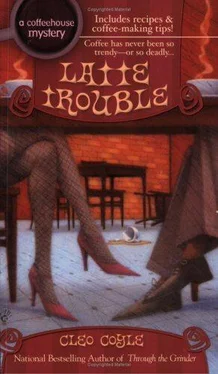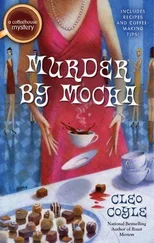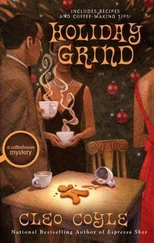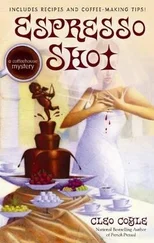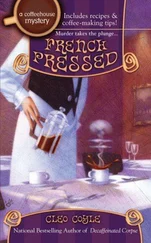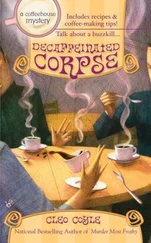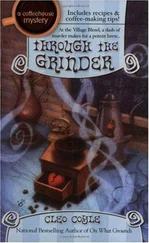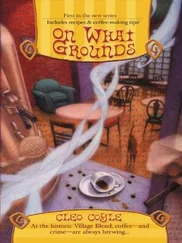Клео Коул - Latte Trouble
Здесь есть возможность читать онлайн «Клео Коул - Latte Trouble» весь текст электронной книги совершенно бесплатно (целиком полную версию без сокращений). В некоторых случаях можно слушать аудио, скачать через торрент в формате fb2 и присутствует краткое содержание. Год выпуска: 2005, ISBN: 2005, Издательство: Berkley, Жанр: Детектив, на английском языке. Описание произведения, (предисловие) а так же отзывы посетителей доступны на портале библиотеки ЛибКат.
- Название:Latte Trouble
- Автор:
- Издательство:Berkley
- Жанр:
- Год:2005
- ISBN:978-0425204450
- Рейтинг книги:3 / 5. Голосов: 1
-
Избранное:Добавить в избранное
- Отзывы:
-
Ваша оценка:
- 60
- 1
- 2
- 3
- 4
- 5
Latte Trouble: краткое содержание, описание и аннотация
Предлагаем к чтению аннотацию, описание, краткое содержание или предисловие (зависит от того, что написал сам автор книги «Latte Trouble»). Если вы не нашли необходимую информацию о книге — напишите в комментариях, мы постараемся отыскать её.
Latte Trouble — читать онлайн бесплатно полную книгу (весь текст) целиком
Ниже представлен текст книги, разбитый по страницам. Система сохранения места последней прочитанной страницы, позволяет с удобством читать онлайн бесплатно книгу «Latte Trouble», без необходимости каждый раз заново искать на чём Вы остановились. Поставьте закладку, и сможете в любой момент перейти на страницу, на которой закончили чтение.
Интервал:
Закладка:
Bryan Goldin was already here. Fen would probably arrive at any moment. Now Lloyd Newhaven and Violet Eyes. The whole gang was here. Were they working together? Separately?
Though I didn’t yet have all the pieces of the puzzle, I still felt Fen was the mastermind and the man to watch today. Last night, he’d given me an interesting song-and-dance about how he had nothing to do with the poisonings, but that grain alcohol in my plum wine proved he was capable of tainting a drink to achieve his goals.
I also remembered what Madame had told me on the phone last night. Was Lottie really the one in danger? Or was she herself the one I should be watching?
I passed through the large dressing area twice, but saw no sign of the accessories designer. Then I heard an amplified voice echoing from the theater.
“…Milan is my favorite show,” a woman’s voice boomed. “The food, the wine—”
Another loud voice interrupted. “And the men! Don’t forget those delicious Italian men…”.
The comment was followed by a peel of strained, high-pitched laughter I instantly recognized as Lottie Harmon’s. I hurried through the door, expecting to find Lottie on the runway, microphone in hand. Instead I saw one of the technicians standing next to a video player. I glanced up at the large screens and saw a rewinding image of three women sitting on a veranda somewhere on a Mediterranean shore.
I ran up to the technician. “Did you just play that tape?”
He nodded.
“What is it?” I asked.
The man shrugged. “A ten-minute retrospective of some kind. It’s scheduled to run before the show starts.”
“Could you please play it again?”
The man shrugged and hit the play button. The clip I’d heard was from a television interview for the Italian network RAI. A scroll at the bottom of the screen indicated it had been taped during the Milan fashion show of 1984. The interview was conducted in English, with Italian subtitles running at the bottom of the screen.
Lottie Harmon, nee Toratelli, sat in a deck chair, her signature scarlet hair lifting lightly on the Mediterranean breeze; her sundress was bright yellow, her long, tanned legs tucked under her. On a chair beside Lottie, her sister Mona Lisa wore a pale green dress. The resemblance between the two women was all the more striking in a moving image.
Also striking was the difference in their manner—Lottie was loud, extroverted, and flamboyant. Mona Lisa seemed serious, quiet, restrained. Almost invisible behind the glamorous pair, the heavyset Harriet Tasky stood in a black pantsuit, her dirty blond hair stirring a bit in the sea air.
It was Mona Lisa who spoke of Milan being her favorite show, of her love of the food and wine. It was Lottie Harmon who leaned into the camera and added the comment about “those delicious Italian men.” But it was Harriet Tasky who laughed that distinctive, strained, high-pitched laugh.
The tape ended abruptly in a shower of crackling static. The man at my side cursed and began to play with the wires. Still in a state of confused shock, I turned. Standing right behind me was the woman who had, for the past year, called herself Lottie Harmon. She was staring in horror at the snowy screen.
“You,” I rasped. “You’re not Lottie Harmon. You’re Harriet Tasky!”
Twenty-Seven
Without a word, Harriet took me by the arm and pulled me to a seat in the back row of the empty theater, far from prying eyes and ears.
“I was Harriet Tasky,” she admitted in a whispered hiss after sitting beside me. “Now I’m Lottie Harmon. What does it matter to you?”
“It matters because my friend is sitting in a jail cell and the only way I know how to get him out is to find out what the hell is going on around here!”
“Shhh, lower your voice,” Harriet insisted. Then the woman’s shoulders sagged. “This week has been hell. First the poisoning at the party, then Rena’s death…” She paused to choke back sudden tears, then just began shaking her head and broke down completely.
“I’m sorry about Rena,” I said. “I really am. But I need to know what’s going on. The truth. Why are you posing as Lottie Harmon?”
“Why do you think?” she said after composing herself and wiping her tears. “Harriet was a nobody in this world. Overweight, shy, unglamorous. Never mind that I created half the pieces that sent the Lottie Harmon label to the top of the fashion world in its heyday. Poor Mona, of course, created the other half.”
“And Lottie Toratelli?”
“She was the professional party girl. The very public, very pretty, flamboyant, well-spoken face of Lottie Harmon. I don’t deny she was vital. She made the connections, the front and back end deals. She put the label and its designs in the papers—by making the scene, showing off the jewelry and accessories, bringing in just the right clientele—”
“The Eveready Bunny,” I murmured.
“Who kept going and going.” Harriet said this with such irony I tried to read between the lines.
“Do you mean drugs?”
Lottie shook her head. “Not drugs. Both Lottie and Mona Lisa had some kind of weird, hereditary allergies. But booze, music, and sex with multiple partners—that was what kept Lottie going.”
“But not you and Mona?”
Harriet waved her hand. “Oh, Mona went clubbing a lot at first, but then she got pregnant by some one-night stand and decided to have the baby. She settled down and became the more responsible sister. I tried the club scene for awhile, but the way I looked…well, let’s just say I got tired of buying drinks and drugs for guys who treated me like crap.”
I let the words hang for a moment. “I guess it was tough for you and Mona—working hard and never getting the credit you deserved for your design work.”
Harriet shrugged. “It didn’t matter, really. We were all getting rich. That had been the plan—and the deal—all along. Things were going great, until that bastard Stephen Goldin started playing his games.”
“Fen?”
She glanced away, her eyes glazing a bit. “Stephen was really something back then—brilliant, cocksure—a straight young clothing designer in a business saturated with gay men. Lottie was drawn to him immediately; Mona soon after that. Moths to a flame, as it turned out.”
“So he encouraged both women’s affections?”
“Encouraged? He reveled in it. For years, he played a twisted cat and mouse game with both women—flaunting his relationship with Lottie, while daring Mona to reveal her own affair with him to her wild, possessive sister. Fen was playing a dangerous game, but no one knew how dangerous until it was too late…”.
Her voice trailed off, but I knew where she was going. “Harriet,” I said softly, “I know Mona died in Bangkok.”
Lottie nodded, closed her eyes. “I saw most of the crap come down in that sick menage a tois, but I managed to miss Armageddon Day, which finally occurred in 1988.”
“What happened?”
She sighed, opened her eyes. “Fen took both sisters to Thailand on phony passports. He had one too. They were planning to smuggle gems out of the country and avoid duties and customs. But with his libido, Fen was probably planning to sample Thailand’s notorious sex industry, as well. Anyway, Mona took her little daughter on the trip, maybe to use her as a decoy, so the authorities wouldn’t suspect them of being smugglers. It was all a stupid, tragic mistake. I didn’t find out the truth about Mona’s death until years later. Lottie confessed it all to me herself, at the end…”.
“The only news item I found on Mona’s death said she fell off a balcony—”
“She was pushed,” Harriet corrected, shaking her head.
Читать дальшеИнтервал:
Закладка:
Похожие книги на «Latte Trouble»
Представляем Вашему вниманию похожие книги на «Latte Trouble» списком для выбора. Мы отобрали схожую по названию и смыслу литературу в надежде предоставить читателям больше вариантов отыскать новые, интересные, ещё непрочитанные произведения.
Обсуждение, отзывы о книге «Latte Trouble» и просто собственные мнения читателей. Оставьте ваши комментарии, напишите, что Вы думаете о произведении, его смысле или главных героях. Укажите что конкретно понравилось, а что нет, и почему Вы так считаете.
